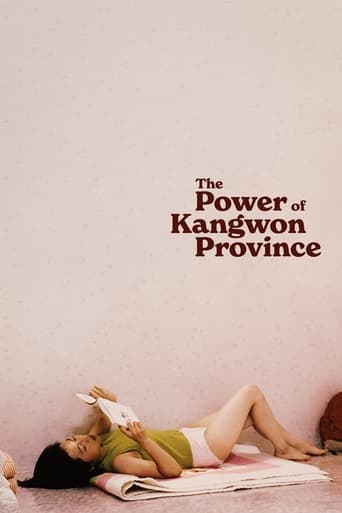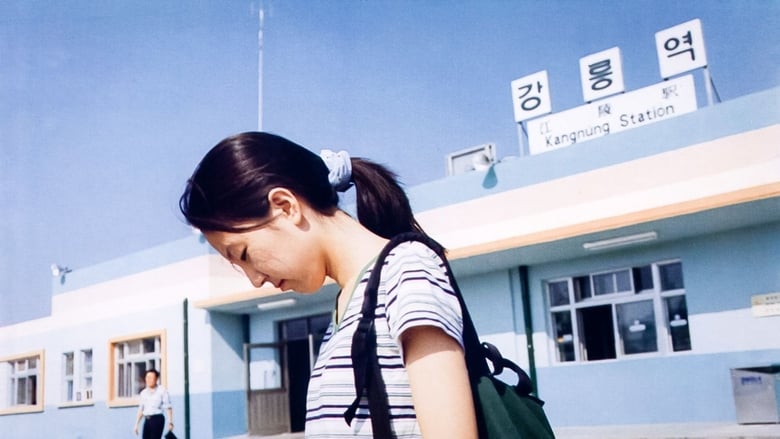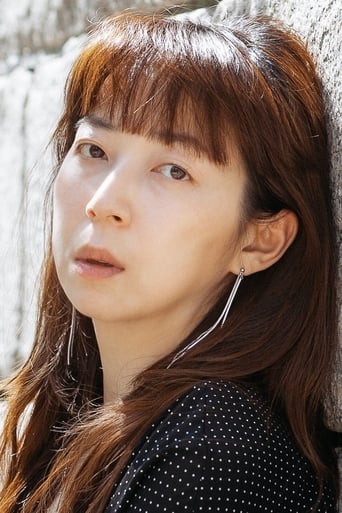

The Power of Kangwon Province (1998)
After a breakup, a young woman goes to a mountain resort on vacation and falls for a married policeman. Unbeknownst to her, her ex is also vacationing there.
Watch Trailer
Cast


Reviews
This is a good movie for those who like art films, of which I am one. The plot is obscured behind some seemingly vacuous dialog for most of the movie, and there isn't really a traditional arc for either the plot or the characters - so you can call this contemplative. The director succeeds in encouraging the audience to recall its own emotional reactions rather than be forced to react along with its characters - you don't really get 'drawn in' to this movie, you're drawn along with it, like watching the scenery change as you float down river. It's successful and well done, but, for all its positives, low on entertainment value.Additionally, this movie is not like Hou Hsiao Hsien or Tsai Ming Liang. This movie does have a more or less stationary camera, lack of score and generally non-glamorous locations and characters, but that does not qualify as similar to or reminiscent of those filmmakers, as other reviewers have suggested. If you want to compare this to another 'Asian New Wave' movie you've seen, this is more in keeping with an Ed Yang film, although lacking the grandeur and narrative complexity. So even that comparison is a stretch. To me, this looks and feels much more like an early Jarmusch movie, just with more sympathetic (if less interesting) characters. That comparison may give you a better sense of what you're sitting down to watch.
Let us begin by saying that this film's English title "The Power of Kangwon Province" is an absolute misnomer.It is because in Hong Sang Soo's film,there are no actual shots of wars,troubles and conflicts.So the idea of establishing power of a province is neither suitable nor valid in the context of this film.If we were to judge this film by its Korean language title,"Kangwon-do ui him" is going to appear as a cryptic statement about emotional turmoils of its young protagonists whose minds are not at rest.Hong Sang Soo has also directed a highly prolific visual document about erratic choices made by people in their lives.The people in question are a couple of young girls who are constantly in the process of displaying their moods,whims and fancies. If making a film out of nothingness can be claimed as a film maker's meritorious virtue then Hong Sang Soo has to be saluted as a courageous film maker whose films speak volumes about ubiquitous nothingness of human relationships,sentiments and lives.Whether one likes it or not,this is the only fair conclusion that be deduced from this particular film.
This is a great film. If this is any indication, than Hong Sang-Soo really is "Asian cinema's best kept secret". It's very similar in style to Tsai Ming-Liang and Hou Hsiao-hsien, and covers a lot of the same ground as them thematically, but I think I actually enjoy this more as a whole than any single one of their films. The overt minimalism is slightly less pronounced here than in their work, although it still completely fits that style (the camera never moves even once), and somehow I found the film less self-consciously "slow" than Tsai Ming-Liang or Hou Hsiao-hsien, which I think is part of the reason I enjoyed it more. Plus, it doesn't keep it's subjects quite as detached as Hou does. I felt like the film was also somehow more "complete" and less open-ended (just barely) than some of their work, although that's not to say it had much of anything resembling a forward-moving plot. I would have a hard time believing that Sophia Coppola wasn't directly influenced by this film for "Lost in Translation" (scenes of a young woman wandering around by herself, and languishing in her hotel room wearing punk panties can't help but seem familiar).
In the film Kongwon-do ui him it features a relatively intimate look into the meaningfulness (as well as general meaninglessness) into the lives of various Koreans; empty people seeking ways to fill themselves, enjoying the escapism of nature. From the beginning to the end of the film we observe the fallibility of the various characters; we learn of their shortcomings and their desires, the overall complexity captured within human life (and yet the overal simplicity of humanity). Although the film is slow-moving, it can be very contemplative. It does not force any ideas, but allows the ideas to come about themselves, it allows the concepts to reveal themselves.The film ends as well and as suddenly as it begins, and one truly understands the meaning of aloneness, that love is often an act of selfishness, and the many mistakes that we make. It is a look into everyday life, very well and beautifully done.If you are looking for action or for intense drama, this is not the film for you. However, if you enjoy honest, original, and meaningful films that are not forced and without glitz, this is a great film to watch.




